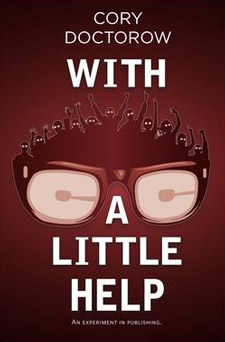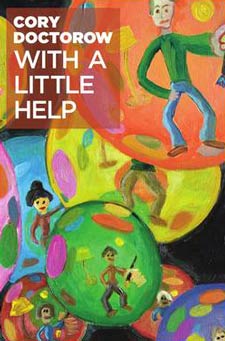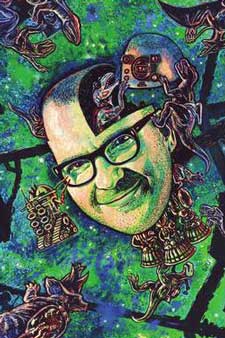Back in 2007, Radiohead stunned the music world by circumventing traditional music publishing channels and releasing their highly anticipated album In Rainbows as a digital download, through their own website and on a pay-what-you-want basis. While you could also order CD and vinyl versions at various set price points, the name-your-own-price strategy for the downloaded album was highly successful and helped motivate other bands to self-release their music.
Cory Doctorow is definitely not new to releasing his books outside of the traditional publishing format. Back in 2003, I felt ever so cool reading his novel Down and Out in the Magic Kingdom on my snazzy Palmpilot Tungsten (with a COLOR screen!) on the New York subway. After all, Cory had released the book under a Creative Commons license, which made my very first e-book also a perfectly legal free ebook.
 Since then, Cory has offered all his novels and short story collections under Creative Commons licenses on his website and did other highly neat things like serializing his novel Makers here on Tor.com. Some people will say “despite,” and others will say “thanks to,” but whichever way you spin it, he’s done remarkably well releasing his stuff for free and at the same time selling an impressive amount of books.
Since then, Cory has offered all his novels and short story collections under Creative Commons licenses on his website and did other highly neat things like serializing his novel Makers here on Tor.com. Some people will say “despite,” and others will say “thanks to,” but whichever way you spin it, he’s done remarkably well releasing his stuff for free and at the same time selling an impressive amount of books.
Cory’s new short story collection With a Little Help is a bit of a departure from his usual format—and seems to take a page from Radiohead’s In Rainbows playbook: rather than going with a major publishing company, the book is published under the author’s own imprint and comes in several formats:
- A print-on-demand paperback (from lulu.com) with four different covers by Rudy Rucker, Pablo Defendini, Frank Wu and Rick Leider.
- A super-limited hand-sewn hardcover that comes with truly unique “endpapers” donated by other authors (including folks like William Gibson and Neil Gaiman) and has an enclosure with an SD card containing the full text of the book and the audio-book.
- DRM-free audio and ebooks in every format under the sun, sold on a name-your-price basis and as usual licensed under Creative Commons.
- A CD audiobook with readings by folks like Wil Wheaton, Patrick Nielsen Hayden, Mary Robinette Kowal, Mur Lafferty and others.
 A fifth option included a one-time, $10,000 chance to commission a new story for the collection, but this was snatched up in no time by Mark Shuttleworth, the tech millionaire behind the Ubuntu Linux project. This lead Cory Doctorow to consider, somewhat ruefully: “Makes me think I’ll ask for $20,000 next time around. I think this is what the economists call “price discovery.”
A fifth option included a one-time, $10,000 chance to commission a new story for the collection, but this was snatched up in no time by Mark Shuttleworth, the tech millionaire behind the Ubuntu Linux project. This lead Cory Doctorow to consider, somewhat ruefully: “Makes me think I’ll ask for $20,000 next time around. I think this is what the economists call “price discovery.”
As if all of this isn’t cool enough yet, Cory Doctorow is taking a few other unusual steps: the book’s financials are available on the author’s website, giving you a detailed look at how this experiment in self-publishing is doing. Cory is also chronicling the entire self-publishing process in a monthly column in Publishers Weekly, which makes for fascinating reading—see, for example, his struggles to get a DRM-free audio-book out to the wider world. One final neat touch: Cory acknowledges readers who email him typo corrections by mentioning them in the book’s footnotes. (You can find mine on p. 82.)
 As for the stories, I think it’s safe to say that anyone who enjoyed Cory Doctorow’s novels will love them. Like his novels Little Brother, Makers and For the Win, they often start with a recognizable core: a present-day technological or sociological concept that Doctorow then pushes just a bit further than you could imagine, but in a way that’s so realistic and commonsensical that you’ll be considering “when” rather than “if” reality will catch up. Several of the stories play with one of Doctorow’s recurring themes: the relationship between information technology and personal freedom, with a special focus on privacy in the digital age. They range from hilarious (“Constitutional Crisis”) to deeply touching (“Visit the Sins”), and when Doctorow really gets going on how diminished our privacy has become (e.g. in “Scroogled”), they’re purely terrifying.
As for the stories, I think it’s safe to say that anyone who enjoyed Cory Doctorow’s novels will love them. Like his novels Little Brother, Makers and For the Win, they often start with a recognizable core: a present-day technological or sociological concept that Doctorow then pushes just a bit further than you could imagine, but in a way that’s so realistic and commonsensical that you’ll be considering “when” rather than “if” reality will catch up. Several of the stories play with one of Doctorow’s recurring themes: the relationship between information technology and personal freedom, with a special focus on privacy in the digital age. They range from hilarious (“Constitutional Crisis”) to deeply touching (“Visit the Sins”), and when Doctorow really gets going on how diminished our privacy has become (e.g. in “Scroogled”), they’re purely terrifying.
Anyone who is involved with books in ways other than just reading them knows that the publishing world is going through massive changes. If you want an idea of the impact those changes have on the authors you read and love, check out With a Little Help’s afterword by Cory’s agent Russell Galen, which makes some eloquent points about today’s changed environment and shows how this book is a great example of adaptation to those changes. Yes, the stories are excellent, and getting this book just to read them makes perfect sense, but there’s another very valid reason why With a Little Help is an Important Book: not only is it an interesting and ongoing experiment that could well become a template for other authors, it’s also a perfect snapshot of a moment in the changing world of book publishing.
Stefan Raets is a reviewer and editor for Fantasy Literature. He lives in San Diego.











I have reasonably enjoyed Cory Doctorow’s books (though I have not read them all) and am glad that he is exploring ways of making them available in a wide range of formats, cost points, and other ‘charitable’ ways. Though, I would not necessarily call his approach a success, in that he does not need a traditional publisher to be widely distributed. He is of course riding on his name. Donald Trump once allegedly said that if he were to lose everything tomorrow he could still be a billionaire by the end of next month. Well sure – he has his name. Change your name, disguise your self, refuse to utilise your hard-won network contacts, (so, start from scratch with no more than your acquired knowledge and experiences) and then get back to me on how well you do. So, if Cory Doctorow were to release a new book without his name on the cover, without using agents or any other of his contacts – just release it into the wild using the budget and means of any up-and-coming author of talent – i’d be interested to see how he does distribution-wise. This would indicate the true state of the business – and the idea of CC as a ‘populariser’ of itself would be shown substantially untrue. If Cory Doctorow wants to empower authors, create a true literary meritocracy, and encourage readership of the ‘long-tail’ products, he would talk to Google/ Amazon about allowing people to search through books by that all-purpose but woefully fuzzy concept of ‘browse’ – and not the current state of the definition. The notion that you could know whether you would like a book by its themes, pace, style, and all those other things that may or may not come through in reading 15-30 page eBook previews. The point being that you could preview dozens of books a day, sorting for those that you truly want to spend your limited hours with. Such concepts as ‘editor’s choices’, ‘you read this, you may like…”, “readers comments”,”dust jacket descriptions” are as much hit and miss as relying on the cover art. Hopefully Cory Doctorow will look beyond his noble first step and truly allow the wide breadth of talent out there be available on a cheap and equitable footing.
Very cool, and kudos to Cory for being so transparent with this experiment.
I remain skeptical of how well this model will work for authors who don’t have the name recognition and platform of a Doctorow (or a Scalzi, Gaiman, etc). There are tons of indie bands releasing their own music out there, and most of them aren’t selling like Radiohead or NIN. Unless an artist has the resources (time/money/aptitude/interest) to build their “brand” (as opposed to work on their art), the self-pub model is gonna be a tough row to hoe. IMHO (wordplay!)
~JGS
designguybrown: Self-promotion is, of course, the only way for an author to get anywhere nowadays.
Cory Doctorow started off completely unknown, and he “made his name” without the benefit of publishers — he publicized himself, extremely effectively. He got published in traditional book form quite a bit *after* he made himself famous online.
Sucks for authors who don’t know how to do their own publicity, but them’s the breaks. Any author who *does* know how to do his own publicity can do perfectly well with the methods Cory uses, and Cory has proven it.